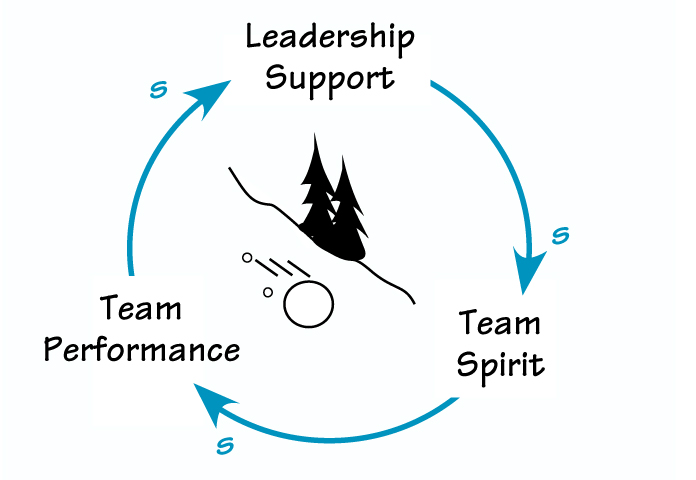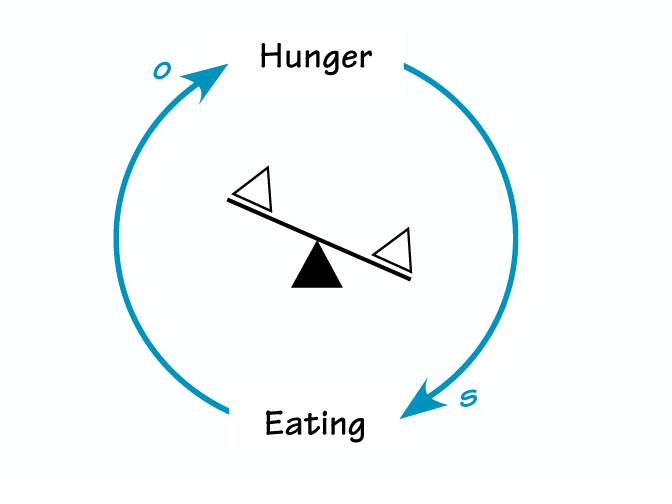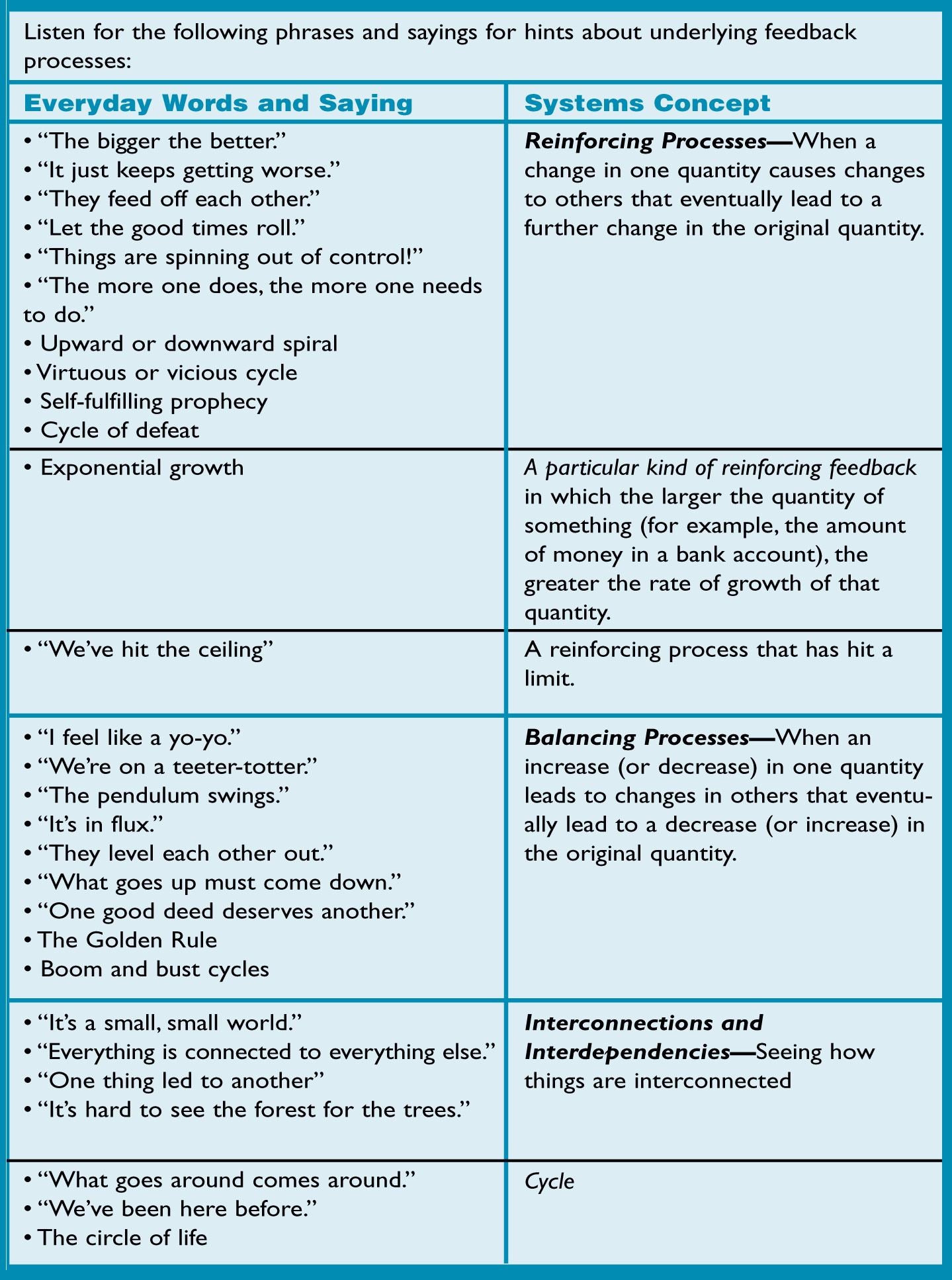How many times have you heard someone say, “This is spiraling out of control” or “We’re on a rollercoaster”? Or seen newspaper articles describe the “boom and bust” cycle of a particular market segment or lament about how the bending of small procedural rules in business and government can “snowball” into big scandals? When people use these kinds of phrases, they often intuitively give hints about the underlying behavior of complex systems. By listening and looking for such “systems clues,” we can gain insight into how systems operate on a fundamental level—and start to think about the most effective ways to implement change.
TEAM TIP
Sometimes people become intimidated by the idea of “adopting” or “implementing” systems thinking in their organizations. But beginning to look at the world through a systemic lens can be as simple as paying more attention to the language we use to describe situations in our everyday work together. Use the tips in this article to sensitize your team members to their own intuitive understanding of systems, as illustrated by the words and phrases they choose to talk about organizational challenges.
Vicious and Virtuous Cycles: Reinforcing Processes
The expression “vicious cycle,” for example, suggests rapidly building momentum in a negative direction.
- An executive might use this phrase to describe how price cuts could lead to a precipitous loss of market share, as customers come to question a product’s quality.
- A teacher might use the term to describe a student whose low self-esteem and poor performance reinforce each other in a downward spiral.
- Many scientists have described the vicious cycle that occurs when a slight rise in atmospheric temperature begins to melt ice in the polar regions; the now bare ground absorbs more heat, causing even more ice to melt.
In systems thinking terms, both vicious and virtuous cycles are reinforcing feedback processes, in which a change builds on itself over time (see “Reinforcing Loop”).
Rollercoaster or Yo-Yo Behavior: Balancing Processes
The expression “rollercoaster” is often used to describe behavior that swings in one direction and then another over time.
- Dieticians talk about “yo-yo dieting,” the tendency for people who have lost weight to gain it back again, prompting another round of dieting and weight gain.
- Business writers refer to the “rollercoaster economy” as a way to remind readers that, during good times, they need to prepare for the inevitable downturn.
- Hospital administrators describe the pressures they experience around supply and demand of medical staff; for example, when demand for doctors goes up, more people go to medical school, leading to an oversupply of doctors. When physicians find it difficult to get jobs, fewer people go into the profession, and hospitals experience staffing shortages.
REINFORCING LOOP

In this virtuous cycle, as leadership support goes up, team spirit rises and leads to improved team performance. Leaders, in turn, respond by increasing their support.
These are balancing feedback processes, in which a set of interactions attempt to return a system back to a state of equilibrium (see “Balancing Loop”). What other words and sayings offer clues to complex systems behavior? See “Hints About Feedback Processes.”
Developing Intuition and Awareness
How can we build on our own and other’s intuitive understanding of everyday systems?
- Listen for the phrases listed in “Hints About Feedback Processes” in conversations and look for them in articles and reports. Then make your own list. What other words and phrases do you use to talk about complex challenges or situations? What words do you hear co-workers or others use?
- Start with terms that suggest trends, patterns, or behavior over time, such as “We’ve been here before” or “Every time we try x, y happens.” By gathering data about past performance, even if it’s anecdotal, you can begin to develop insight into the problem.
- After noticing these patterns of behavior, ask, “What set of interrelationships may be causing that behavior?” Look for an underlying balancing or reinforcing process.
- For example, if you hear someone say, “I feel like a yo-yo,” work to identify the underlying balancing structure. Ask for details about their experiences. How have they responded in the past? What is the goal in the situation? Is it to maintain the status quo? To keep the pressure off? How might changing the goal change the dynamic? How might they respond in the future to avoid the inevitable backlash?
- If you hear someone in your organization say, “This is a vicious cycle!” you are likely caught in a reinforcing feedback loop. Again, inquire into what has happened to date. How have previous interventions actually contributed to the behavior you are now experiencing? What might be the inherent limit in the seemingly limitless growth? What actions could you take to change a link in the reinforcing loop of cause-and-effect?
BALANCING LOOP

In this simple balancing loop, a rise in hunger leads to an urge to eat. Eating then reduces hunger—at least until the next meal!
It is helpful to know the terms and labels of systems thinking. But it is equally important to develop our own intuition and awareness about the dynamics in our everyday lives. When we listen to those around us with a systems ear, we’re likely to hear a great deal of intuitive understanding about how systems behave and gain insight into how we can begin to address our most challenging problems.
HINTS ABOUT FEEDBACK PROCESSES

Linda Booth Sweeney is a researcher, author, and consultant who investigates and develops methods and tools for defining, investigating, and solving systems-based challenges. With Dennis Meadows, she wrote The Systems Thinking Playbook (1995/1998/2001), a three-volume book of systems thinking exercises for use by managers, consultants, and educators. Linda is also the author of When a Butterfly Sneezes: A Guide for Helping Children Explore Interconnections in Our World Through Favorite Stories (Pegasus Communications, 2001). She received her doctorate from Harvard’s Graduate School of Education in June 2004.
This article is adapted from a laminated pocket guide, “Systems Clues in Everyday Language.” For more information, go to www.pegasuscom.com/levpoints/lp83.html and look for the pocket guide in the right hand column.
